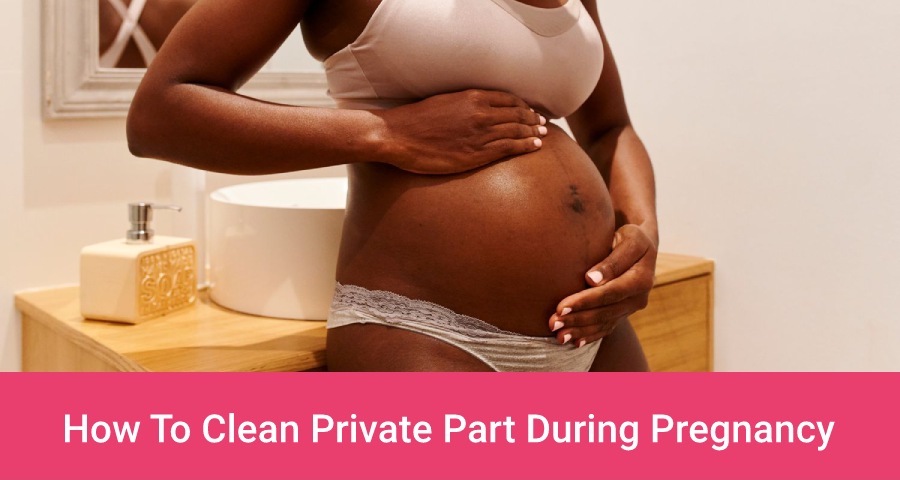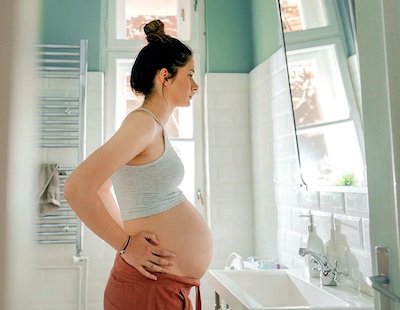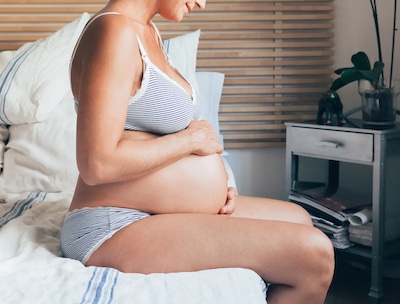
Article by Jessica Pierce – Registered Nurse & Nationally Registered Paramedic
“Down there care” is complex enough for women already. How much more complicated can it get during pregnancy?
Fortunately for all the slightly overwhelmed mamas out there, keeping your vagina healthy is fairly simple. All you really need is a pregnancy-safe intimate wash, warm running water and breathable maternity panties.
In this article, I’ll answer your most sensitive questions on how to care for your most sensitive skin, and whether or not feminine wash is safe during pregnancy. Keep reading for a quick breakdown of how to keep your intimate area healthy during pregnancy and childbirth.
This article is not a substitute for medical advice or consultation.
Vagina & Vulva – Differences
The vagina and the vulva are actually two different parts of the female body, and both are affected by pregnancy1.
The term “vagina” refers to the birth canal, i.e. the muscular tube leading from the vaginal opening to the uterus. The vulva, however, is the external area around the vaginal area that includes the labia, urethra, and surrounding skin.
Just like an oven, the vagina is self-cleaning. It isn’t necessary to clean the inside of the vagina – in fact, vaginal discharge is actually the vagina cleaning itself. We’ll discuss more about vaginal discharge later in this article.
What is important to keep clean during pregnancy and beyond is the vulva. The folds of skin created by the labia easily trap dirt, odor, and moisture, and are important to keep clean for good overall health.
Why Is Intimate Hygiene So Important During Pregnancy?
Good hygiene in regards to your private area includes cleaning the vulva, or external genitalia. The folds of skin around your vagina can trap germs and moisture easily, leading to increased risk of bacterial infections.
Intimate hygiene during pregnancy is especially important because pregnant women are at higher risk for infections like yeast overgrowth and bacterial vaginosis, or BV2.
There are a few over-the-counter products like lactic acid and boric acid that can help to manage these symptoms; however, many reoccurring infections require prescription medications to get everything back on track – not all of which are safe for pregnant women.
Talk to your doctor if infection or irritation of your vaginal area reoccurs or persists while you’re pregnant. Some vaginal or sexually transmitted infections, like trichomoniasis, can be dangerous for your baby or even lead to premature birth3.

How Can I Keep My Private Parts Clean During Pregnancy?
The most effective strategy to avoid infections, maintain intimate hygiene, and avoid health problems for you and your growing baby is to use a gentle, pregnancy-safe intimate wash.
Intimate Wash
The easiest way to do this is to use clean hands or a clean washcloth to gently wipe the vulvar area with a small amount of intimate hygiene wash and rinse with warm running water. This is very easy to do in the shower, or can be done in the bath as well.
Bye, Bye Synthetic Panties
Another way to keep your intimate area clean and your vagina healthy is to avoid wearing tight clothes and synthetic underwear. The materials in synthetic fabrics trap sweat and harmful bacteria, increasing your risk of a vaginal bacterial infection.
Hello Loose Clothing
Tight clothing keeps dirt and impurities close to the skin which can also facilitate bacterial growth and vaginal infections. Fill your wardrobe with loose, flowy and breathable closet staples that will facilitate air flow and healthy ventilation.
This may be a bit more difficult to do during winter, but should be a breeze in summer. On the bright side, pregnant women have naturally higher body temperatures – which keeps you warmer, but also makes you more likely to sweat.

What Can I Use To Clean My Private Part During Pregnancy?
- Avoid harsh soaps
They can cause skin irritation or disrupt the pH balance of your vagina. Use warm water and an intimate hygiene wash designed for sensitive areas to gently cleanse your intimate areas.
- Use an unperfumed intimate wash to keep your vagina clean
Perfumed products can irritate the vagina and cause symptoms like rashes, redness, discomfort, dryness, and burning.
- Stay away from traditional soap
Avoid traditional soap when possible as it can upset your vaginal pH balance. This places you at higher risk for yeast infections, dryness, and discomfort.
- NO DOUCHING!
Gynaecologist experts all across the board have recommended against douching4, regardless of whether or not you’re pregnant. Douching has been shown to increase risk of infection by washing out the natural vaginal flora present in your reproductive organs5.
When the number of beneficial bacteria is decreased by douching, bacterial growth of unhelpful microbes skyrockets, leading to increased risk of vaginal infections. This can be bad news for pregnant women!
What Is The Best Way To Remove Pubic Hair When Pregnant?
This is a complex subject, but my recommendation is to trim pubic hair using a mirror and a trimmer. This is the safest and most comfortable method for most women.
Make sure to keep your vagina clean before attempting to remove pubic hair. Bathe the area with an intimate hygiene wash, and give yourself plenty of time to carefully navigate the area.
For a more in-depth how-to on hair removal from your intimate area while you’re pregnant, check out this article on how to remove pubic hair during pregnancy.

Tips For Maintaining Good Intimate Hygiene During Pregnancy
Here are just a few more tips on how to maintain good hygiene for a healthy vagina:
- Always wipe front to back after you go to the bathroom. This helps protect your urethra from being exposed to harmful bacteria that can cause UTIs or bladder infections.
- Steer clear of douching at all costs.
- Use an intimate wash that’s hypoallergenic, fragrance-free, and made for sensitive skin6.
- Wear breathable underwear that wicks away sweat7.
- Maintain good overall health – eat healthy, drink lots of water, and keep up a moderate level of physical activity that feels comfortable for you.
- Don’t be afraid of vaginal discharge! A mild odor or clear to white color is completely normal. Simply use a gentle intimate wash to cleanse away excess discharge daily.
- Symptoms like increased vaginal discharge or vaginal irritation might warrant a visit to your doctor, however. These concerns might be signs of sexually transmitted infections or yeast infections.
How To Clean Private Part Before Giving Birth
Use a gentle intimate wash to cleanse your private area before heading to the hospital, if you have time.
Don’t worry too much about what’s going on down there though – any labor and delivery nurse can tell you she doesn’t really care that much8. After all, it is her job.
Here’s one more reminder to avoid douching. It won’t necessarily benefit your vaginal hygiene, and if it leads to you getting a yeast infection, that certainly won’t help with odor!

How Does Pregnancy Affect Your Vaginal Health
While you’re pregnant, your body produces more of the hormones estrogen and progesterone. These hormonal changes are crucial to ensuring that your baby develops properly, but they also mean noticeable external changes for most women.
You may notice a change in the color of your vulvar area, or swelling of the labia during pregnancy. This is totally normal, and due to the increased blood flow that occurs as a result of the increase in pregnancy hormones9.
The article from the American College of Gynecologists10 explains in detail a lot of the changes that pregnant women go through “down there” both before and after giving birth.
Another less fun side effect of the hormonal changes of pregnancy is that you’re more likely to develop infection. This is why it’s extra important to avoid harsh soap or douching in order to minimize the chance you’ll develop a yeast infection during pregnancy.
Some light vaginal bleeding or spotting in the first few weeks of pregnancy can be normal, caused by the implantation of a fertilized egg into the lining of your uterus.
If, however, you notice vaginal bleeding any time after the second trimester of pregnancy, contact your doctor right away. This could signal a bigger problem.
What Vulvovaginal Changes Can Occur After Pregnancy?
Vaginal discharge after giving birth can take a few weeks to return to normal. You’ll likely experience bright red bleeding with some clots for a day or two, and then period-like discharge for up to a few weeks.
It takes about six weeks for your vagina to return to its initial elasticity11. Pelvic floor exercises and kegels can help speed up this process as well as lowering your risk for complications after you give birth.
It’s important to note that breastfeeding can slightly lower estrogen levels, making vaginal dryness more of a problem. If you experience this, keep using a moisturizing intimate wash and use water-based lubricants when needed.
Article By Jessica Pierce, RN
Jessica Pierce is Registered Nurse, Nationally Registered Paramedic, writer, and contemporary dance artist based in Tulsa, Oklahoma. She holds two undergraduate degrees from Oral Roberts University – a Bachelor’s of Science in Nursing (2018) and a Bachelor’s of Art in Dance Performance (2019).
The purpose of this article is informative. It’s not a substitute for professional medical advice or medical care. Remember: safety first! Consult your doctor/pediatrician in case of any doubts. The author of this article does not accept any responsibility for any liability, loss or risk, personal or otherwise, incurred as a consequence, directly or indirectly, from any information or advice contained here.
Resources:
https://www.acog.org/
https://www.healthshots.com/
https://mylofamily.com/
https://www.beautydirectory.com.au/
https://www.womenshealth.gov/
https://www.healthline.com/

